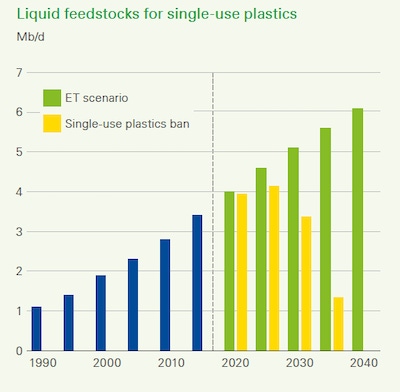BP: Single-use plastic ban will lead to higher carbon emissions, increased food waste
The oil major’s 2019 Energy Outlook raises questions about the rationality of a ban on single-use plastics and plastic packaging.
February 15, 2019

The 2019 edition of BP’s Energy Outlook raises some interesting environmental outcomes if the world transitions to a global ban on single-use plastics, including packaging, by 2040. BP’s evolving transition (ET) scenario already assumes that the regulation of plastics tightens more quickly than in the past. But growing concerns about the use of plastics means that regulation of plastics may tighten even more.
|
Global demand for liquid feedstocks used in plastics production will plummet if plastic packaging and other single-use plastics are banned outright by 2040; however, production of alternatives from paper and aluminum will more than likely result in increased carbon emissions. |
The alternative "single-use plastics ban" (SUP ban) scenario drawn up by BP considers a case in which the regulation of plastics is tightened more quickly, culminating in a worldwide ban on the use of plastics for packaging and other single uses from 2040 onwards. These single-use plastics accounted for just over a third of plastic products produced in 2017.
In this alternative scenario, formulated by BP from its perspective as an oil producer, the growth in liquid fuels used in the “non-combusted sector” is reduced to just one million barrels/day, which is six million barrels/day lower than in the ET scenario – and the overall growth of liquids demand is limited to four million barrels/day, compared with 10 million barrels/day in the ET scenario.
BP does note that the SUP ban scenario does not account for the energy that would be consumed to produce the alternative materials — presumably paper, aluminum, steel and other non-fossil-fuel-based products whose production is typically much more energy- and resource-intensive; just think of the steel straw—required to replace single-use plastics, and so represents an upper-bound of the impact on liquid fuels. Indeed, without further advances in these alternative materials and widespread deployment of efficient collection and reuse systems, BP notes that a plastics ban could lead to an increase in overall energy demand and consequently higher carbon emissions, and raise a number of other environmental concerns, such as increasing food waste.
The BP report suggests that industry and consumers need to accept plastic packaging as a key player in combating climate change and minimizing food wastage. Rather than an outright ban on single-use plastics and packaging, the world needs to adopt a holistic approach centered on establishing recycling systems worldwide, increasing the recycled content in food packaging, putting in place infrastructure such as sewage systems in developing countries that would play a role in reducing the flow of plastics and other waste into river systems and the oceans, and considering bio-based plastics, where appropriate.
About the Author(s)
You May Also Like





